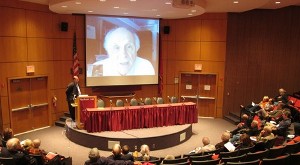 Does the fact that we live in a democracy mean that if we want the government to enforce a policy, they have to do it? Not according to John Locke. Not when it would mean creating a voluntary dictatorship.
Does the fact that we live in a democracy mean that if we want the government to enforce a policy, they have to do it? Not according to John Locke. Not when it would mean creating a voluntary dictatorship.
In chapter eight of book two of his Two Treatise of Government, John Locke sets out that famous principle that all democratic societies now take for granted: A just society can only be governed with the consent of the people:
Men being, as has been said, by nature all free, equal, and independent, no one can be put out of this estate and subjected to the political power of another without his own consent, which is done by agreeing with other men, to join and unite into a community for their comfortable, safe, and peaceable living, one amongst another, in a secure enjoyment of their properties, and a greater security against any that are not of it. This any number of men may do, because it injures not the freedom of the rest; they are left, as they were, in the liberty of the state of Nature. When any number of men have so consented to make one community or government, they are thereby presently incorporated, and make one body politic, wherein the majority have a right to act and conclude the rest.
For, when any number of men have, by the consent of every individual, made a community, they have thereby made that community one body, with a power to act as one body, which is only by the will and determination of the majority.
However, Locke explained, the fact that you are governed with your consent does not mean that those who govern you may do nothing without your consent. You have given them your permission to govern, and you must wear that fact:
And thus every man, by consenting with others to make one body politic under one government, puts himself under an obligation to every one of that society to submit to the determination of the majority, and to be concluded by it; or else this original compact, whereby he with others incorporates into one society, would signify nothing, and be no compact if he be left free and under no other ties than he was in before in the state of Nature. For what appearance would there be of any compact? What new engagement if he were no farther tied by any decrees of the society than he himself thought fit and did actually consent to? This would be still as great a liberty as he himself had before his compact, or any one else in the state of Nature, who may submit himself and consent to any acts of it if he thinks fit.
Once you have banded together as a society and given consent to a body of people to govern you, you cannot simply withdraw that consent at whim because you do not like a decision that this body makes.
Let me then introduce a question: What if we, as a society, agreed together and gave consent to a governing body to rule over us with absolute power. What if we deliberately elected a tyrant, intending to grant that tyrant the very power of life and death over us, with the ability to enslave us, to take our property at whim whether we want him to or not etc? The question is similar to a microcosmic version of the same question (if only because Locke’s answer applies to both cases): What if we just agree with our friend that he has the right to torture and kill us? What if we hand him a gun and consent to him blowing our brains out – to exercising absolute power over whether we live or die? Going back to a societal model, the question is something like this: Can we legitimately enter into a voluntary dictatorship?
In a word, no. But why not? Don’t you have absolute ownership of your own life? Can’t you choose to allow another person to exercise that right for you? It’s your choice, your life, your body, right? Perhaps surprisingly for some moderns (especially Locke’s libertarian fans), Locke’s answer was a resounding “no” to these questions.
Though the legislative, whether placed in one or more, whether it be always in being or only by intervals, though it be the supreme power in every commonwealth, yet, first, it is not, nor can possibly be, absolutely arbitrary over the lives and fortunes of the people. For it being but the joint power of every member of the society given up to that person or assembly which is legislator, it can be no more than those persons had in a state of Nature before they entered into society, and gave it up to the community. For nobody can transfer to another more power than he has in himself, and nobody has an absolute arbitrary power over himself, or over any other, to destroy his own life, or take away the life or property of another.
Locke, Two Treatises on Government, book 2, chapter 11, paragraph 35.
You can’t give away what isn’t yours to begin with, reasons Locke, and the “absolute arbitrary power” to destroy your very life does not belong to you. Obviously the ability is yours, but here Locke means legitimate power. And why not? Locke is characteristically clear here too:
The state of Nature has a law of Nature to govern it, which obliges every one, and reason, which is that law, teaches all mankind who will but consult it, that being all equal and independent, no one ought to harm another in his life, health, liberty or possessions; for men being all the workmanship of one omnipotent and infinitely wise Maker; all the servants of one sovereign Master, sent into the world by His order and about His business; they are His property, whose workmanship they are made to last during His, not one another’s pleasure. And, being furnished with like faculties, sharing all in one community of Nature, there cannot be supposed any such subordination among us that may authorise us to destroy one another, as if we were made for one another’s uses, as the inferior ranks of creatures are for ours.
Locke, Two Treatises on Government, book 2, chapter 2, paragraph 6.
You cannot give away the right to another to own your life, because you do not have it. That belongs to God.
Glenn Peoples


 For someone in my position when it comes to academic and professional interests, geographical isolation is one of the biggest barriers between me and a large number of opportunities: Conferences, speaking opportunities and job opportunities, virtually all of which lie outside of New Zealand.
For someone in my position when it comes to academic and professional interests, geographical isolation is one of the biggest barriers between me and a large number of opportunities: Conferences, speaking opportunities and job opportunities, virtually all of which lie outside of New Zealand.
 The other day I met Jill Stanek in Dunedin as she was traveling through New Zealand on the Pro Life Tour. Jill has a pretty horrific story to tell – but she’s not the only one by any means who has seen this. Watch the clip below where she is interviewed by Bill O’Reilly and explains “live birth abortion,” a procedure where a living and often perfectly healthy but very premature baby is born so that it will die:
The other day I met Jill Stanek in Dunedin as she was traveling through New Zealand on the Pro Life Tour. Jill has a pretty horrific story to tell – but she’s not the only one by any means who has seen this. Watch the clip below where she is interviewed by Bill O’Reilly and explains “live birth abortion,” a procedure where a living and often perfectly healthy but very premature baby is born so that it will die: This one has more relevance to my American readers than to others.
This one has more relevance to my American readers than to others. 

 I know this may come as a total shock to many readers, but some politicians are not amazingly bright. Or at least even if they are, the arguments that they use to make a political point are – to put it somewhat gently – not always water tight. While this isn’t exactly front page news, I was browsing through some things that are front page news, and my eyes were assaulted with a couple such examples, and was prompted to mention them. For the record, I’m not a member of any political party and I didn’t vote for either National or Labour. I’d like to think that I would right now be reacting the same way no matter which major party was leading the government, and no matter which party had opposition MPs making ridiculous arguments. It’s about good philosophy, no more and no less.
I know this may come as a total shock to many readers, but some politicians are not amazingly bright. Or at least even if they are, the arguments that they use to make a political point are – to put it somewhat gently – not always water tight. While this isn’t exactly front page news, I was browsing through some things that are front page news, and my eyes were assaulted with a couple such examples, and was prompted to mention them. For the record, I’m not a member of any political party and I didn’t vote for either National or Labour. I’d like to think that I would right now be reacting the same way no matter which major party was leading the government, and no matter which party had opposition MPs making ridiculous arguments. It’s about good philosophy, no more and no less. Nick “The Slasher” McGurk was found guilty of no fewer than nine counts of first-degree murder. A jury took just ten minutes to reach a unanimous guilty verdict. The case was open and shut. The judge donned his black cap and passed sentence: “Nicholas James McGurk, the court sentences you to death by hanging. Your sentence shall be carried out on a weekday next week in a turn of events that meets the following description: You are to be taken from your cell at midday to be hanged, but you will not know the day of your execution until the executioner knocks on your door on that that fateful day. That moment shall come as a thief in the night, in a most unpleasant surprise.”
Nick “The Slasher” McGurk was found guilty of no fewer than nine counts of first-degree murder. A jury took just ten minutes to reach a unanimous guilty verdict. The case was open and shut. The judge donned his black cap and passed sentence: “Nicholas James McGurk, the court sentences you to death by hanging. Your sentence shall be carried out on a weekday next week in a turn of events that meets the following description: You are to be taken from your cell at midday to be hanged, but you will not know the day of your execution until the executioner knocks on your door on that that fateful day. That moment shall come as a thief in the night, in a most unpleasant surprise.”